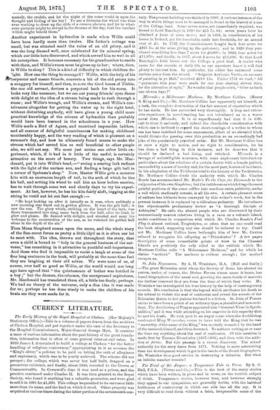Miranda ; a Midsummer Madness, By Mortimer Coliins. (Henry S.
King and Co.)—Mr. Mortimer Collins has apparently set himself, as a task, the complete destruction of the fair amount of reputation which he has made. He has succeeded very thoroughly. A long and exten- sive experience in novel-reading has not introduced us to a worse novel than Miranda. It is so superfluously bad that it is diffi- cult to treat it seriously, and indeed the charitable consideration with which one is inclined to regard the short-comings of a writer to whom one has been indebted for some amusement, albeit of no elevated kind, would dictate the passing over this production as an exceedingly bad joke of the ponderously practical order. But Mr. Mortimer Collins has at once a right to notice, and no right to consideration, for he has done a bad thing in this instance, and ho deserves that it should be declared a bad thing, and rebuked. Miranda is a farrago of unintelligible nonsense, with some unpleasant introductory particulars about the relations of a certain doctor with a female patient, succeeded by a mass of tawdry and, for the most part, borrowed incidents. In his adaptation of the Tichhorne trial to the history of the Tachbrooks, Mr. Mortimer Collins rivals the audacity with which Mr. Charles Reads has accommodated Mr. Boyle's To the Cape for Diamonds to tho exigencies of his own Simpleton; but the ruthlessness which drags the most painful portions of the cause celPbre into needless extra publicity, under a veil which studiously reveals, is all his own. A certain pleasant sense of culture has hitherto been conveyed by this writer's work, but in the present instance it is replaced by a ridiculous pedantry. He introduces the objectionable preliminary doctor as "a thorough disciple of Asklepios." He calls the absurd people who are discovered by their unconsciously nearest relatives living in a cave on a volcanic island, under conditions in comparison with which Mr. Charles Reade's Foul Play is almost rational, Troglodytes, so often that no one could read the book aloud, supposing any one should be induced to try. Could not Mr. Mortimer Collins have bethought him of how Mr. Caxton refused to recognise his offspring as " Peisistratos"? A few pages descriptive of some remarkable points of view in the Channel Islands are positively the only relief to the rubbish which Mr. Mortimer Collins calls "A Midsummer Madness," and for which he claims "method." The madness is evident enough ; the method escapes us.






























 Previous page
Previous page